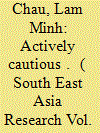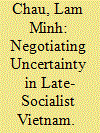| Srl | Item |
| 1 |
ID:
158203


|
|
|
|
|
| Summary/Abstract |
This article uses the case of a northern Vietnamese village to explore how rural households in Asia have negotiated both the opportunities and challenges of marketization and capitalist industrial modernity. I focus on the Vietnamese state’s push to marketize village livelihoods by means of mass establishment of industrial parks comprising largely Foreign Direct Investment factories in the countryside. The state expects young villagers to abandon low-value agricultural livelihoods and treat factory work as their only livelihood strategy and the lifetime warranty of their well-being. Yet while young villagers have been responsive to new opportunities of industrial employment, they have all treated factory work in ways very different from what the state expects: merely as one of their household’s diverse portfolio of livelihood options. I argue that villagers have handled the encounter with industrial modernity in ways rarely documented in the literature on marketization in rural Asia: as ‘actively cautious’ decision-makers, who actively pursue industrial employment to improve their family’s living standards, and carefully maintain a portfolio of livelihood strategies to protect the family’s well-being from the many insecurities of the industrial workplace.
|
|
|
|
|
|
|
|
|
|
|
|
|
|
|
|
| 2 |
ID:
168774


|
|
|
|
|
| Summary/Abstract |
This article makes a case for Vietnam as a distinctive example of late- and post-socialist marketization, a painful experience that has brought widespread immiseration to rural societies within and beyond Asia. Building on extensive ethnographic fieldwork in a northern Vietnamese village, I explore a hitherto under-researched aspect of Vietnam's massive social and economic transformation in the 30 years since the onset of market transition or Renovation (Đổi mới): the surprising ways in which rural households have negotiated both the risks and opportunities of the state's push to de-cooperativize and marketize village livelihoods. The state expects that a minority of rich farmers will rapidly move into large-scale, mechanized farming, while the majority will abandon small-scale subsistence farming to specialize in trade or participate in industrial waged employment. Surprisingly, all village households insist on being đa gi năng, that is, on retaining multiple livelihood options instead of following the official modernization scripts. Their refusal to follow state plans is not market-averse ‘resistance’, but something rarely documented in the literature on peasant life in marketizing contexts: a local sense of agency and taking personal responsibility for the security and long-term welfare of their families, in the face of highly unpredictable state policies.
|
|
|
|
|
|
|
|
|
|
|
|
|
|
|
|